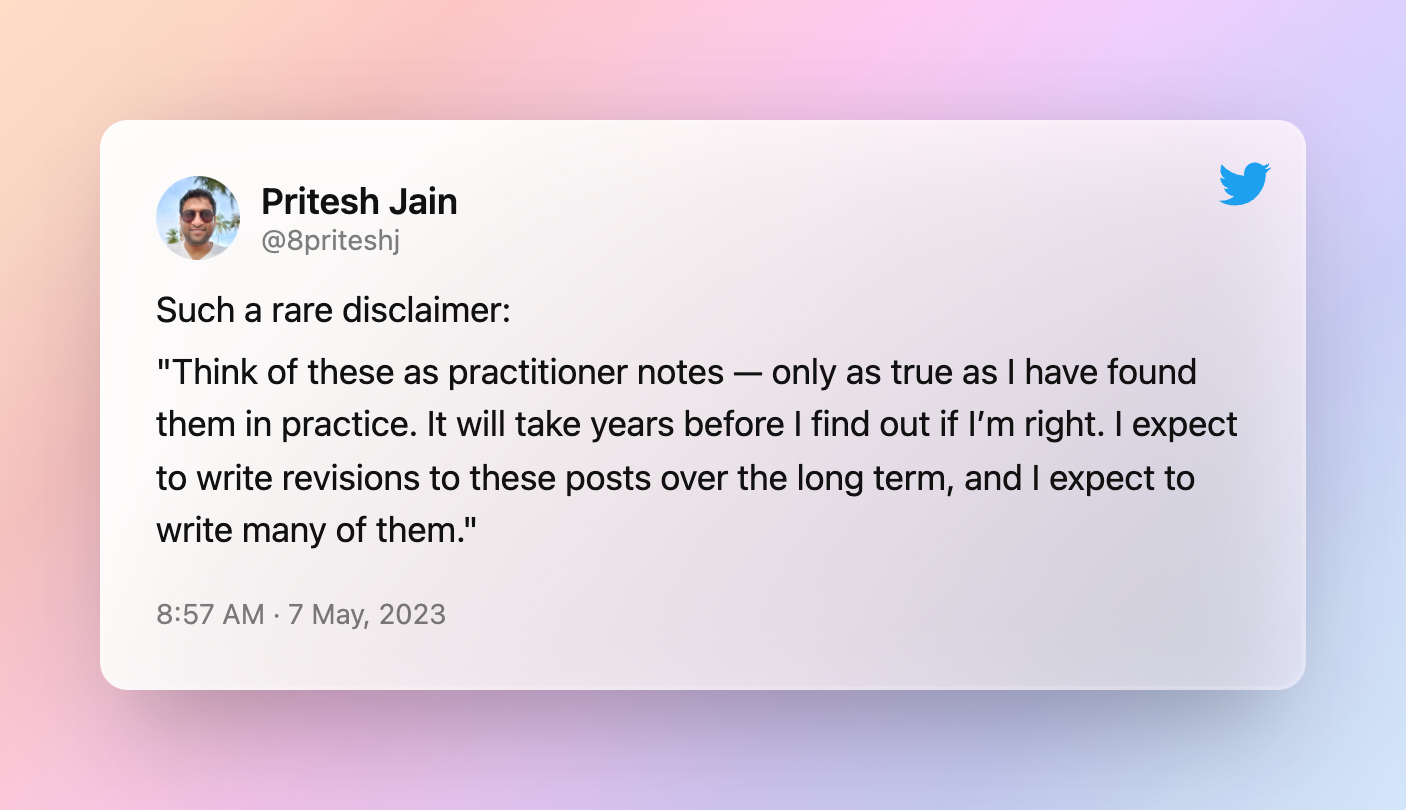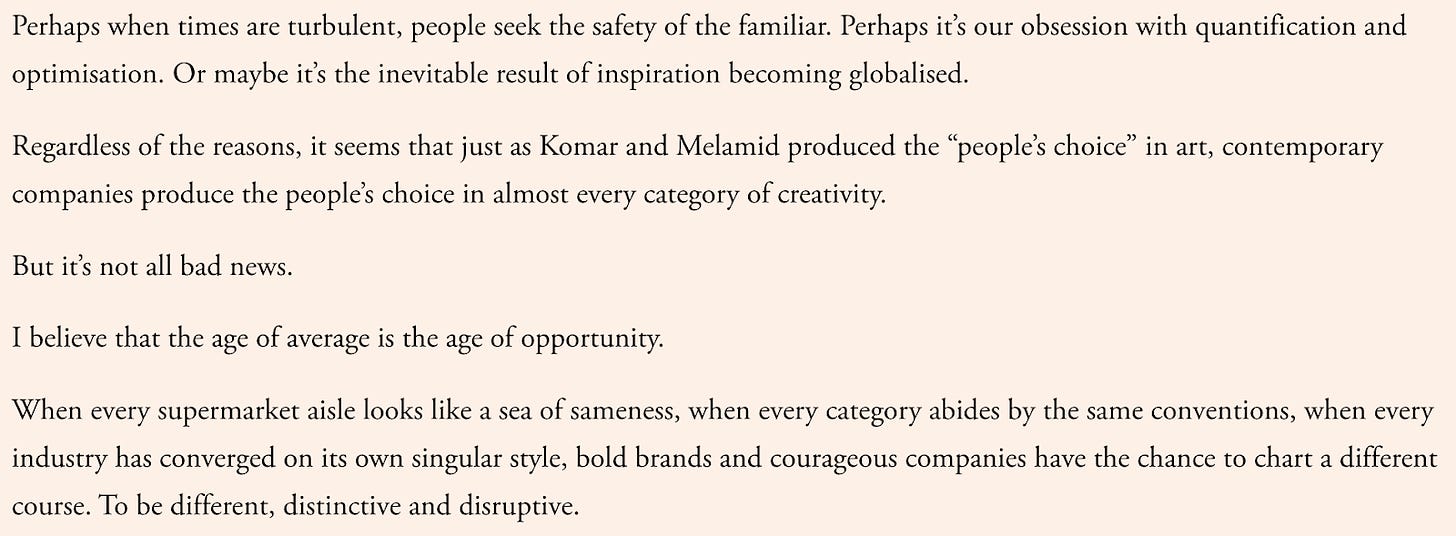Hey, Pritesh here.
We’ve reached post #105 in this journey of discovering new ideas & inspirations.
Here’s a quick glance of today’s post:
🇨🇳 Chinese businessman paradox
⚠️ Unforced errors
🎨 Hobbies vs hustle
🚴 Tacit & explicit knowledge
🟰 Age of averages
And much more…
If you enjoy reading “Stay Curious”, show your love by ❤️’ing it or leaving a comment or sharing it with a couple of your friends. Any support is highly appreciated.
And with that, let’s dive in.
1. Chinese Businessman Paradox
The Chinese Businessman Paradox - this five part series on Commoncog is not the usual stuff that I share in this newsletter. But I really loved this and so here it is.
Cedric Chin starts with the following premise.
The idea of a savvy business leader emerging from a humble background, thriving despite adversity, is one of the strongest touchstones in the stories that make up who we are. It is in the family histories of all those Chinese who migrated out of China; it is the story of our grandfathers, uncles, and (occasionally) aunties, making a living on distant shores; if we have no direct relationship to a relative in business, it is the stories that we are familiar with through our friends and their families.
It sounds fairly similar to what we’ve heard in India about Baniyas, Marwadis & Parasi business folks - the dhandho gang!
The five part series goes on to break it down into possible reasons & their implications for others. I loved this series because it does not try to make any grand promise of lessons to learn from. In fact, this is one of the core theme of Cedric’s message in these posts:
Bookmark this for your weekend read when you want to explore a totally new set of ideas.
2. Unforced errors
Sahil Bloom spoke of the concept of Circle of competence in his recent post.
The Circle of Competence says that each person has a unique set of skills, knowledge, and experience that they can use to analyze and evaluate opportunities effectively.
By identifying and judiciously staying within their Circle of Competence, you can avoid making uninformed decisions and reduce the risk of loss.
Source: Sahi’s post
He goes on to clarify…
Importantly, your Circle of Competence is not a fixed entity. It can (and should!) expand as you learn and grow.
Knowing and operating within your circle of competence can be a great way to avoid unforced errors.
Top this awareness with an innate curiosity to become better - or as Sahil says expand your circle of competence - and you can become a force to reckon with in whatever you do.
3. Hobbies vs Hustle
Anne-Laure Le Cunff’s short essay “Don't pin the butterfly” is a friendly reminder to all of us. She urges that “not all hobbies need to become hustles”
Some highlights from her post…
Sometimes, ideas and passions are best left alone, given enough space to expand, travel, and connect with other ideas and passions.
To me, the main difference between a hobby and a hustle is whether you have to do it even when you don’t want to.
And finally,
When you put it this way, it makes sense to keep some hobbies that are just that—hobbies. Spaces of self-expression where you can experiment and play whenever you feel like it. Butterflies have often been used as a metaphor for freedom. Turning every single hobby into a hustle is akin to walking around with a cyanide-filled jar to kill and pin every butterfly you see. Sometimes it’s better to just enjoy the chaos of your creative flow without trying to capture and catalyse it.
(via Sahil Bloom’s newsletter)
4. Tacit & Explicit knowledge
Knowledge is not a one dimensional thing. Stoa’s post around tacit and explicit knowledge is a great resource to help build your understanding of it.
It starts with definition & example of the two kinds of knowledge, expanding to how great products can help transfer them seamlessly and finally to the realms of adaptive and technical problems. A couple of my favourite snippets from the post:
Adaptive & technical problems:
Adaptive problems require experimentation, novel strategies, or new ways of thinking and being; they’re problems containing “unknown unknowns” and are often opaque in addition to being difficult. Technical problems may be equally difficult, but their difficulty lies in execution — where the path to the solution is known or knowable and does not need to be discovered.
Difference between a mechanic & engineer:
A mechanic can only troubleshoot a vehicle insofar as the problem is within their mental library of problem-solution sets. Not knowing the first principles or building blocks of energy, electricity, and thermodynamics, they are often ill-equipped to solve problems they haven't faced yet and don't have a playbook for.
In contrast, a good engineer knows the fundamental mechanisms that make a car work and then based on that knowledge, is now equipped to solve yet-unsolved problems.
A mechanic knows solutions in isolation; an engineer on the other hand has the ability to crystallize patterns and apply them to novel contexts.
5. The Age of Averages
Alex Murrell’s essay “The age of average” is an uncomfortable read. It’s calling out all the ways we’ve become ‘average’ and are somehow proud about it. These are trends that are happening, right under our noses. And we’re ok about it.
The post had many beautiful examples illustrating “the Instagram pictures we post, the tweets we read, the TV we watch, the app icons we click, the skylines we see, the websites we visit and the illustrations which adorn them all look the same. The list goes on, and on, and on.”
However, I find this one the most interesting bit to remember. It’s not all bad news!
(via Refind)
6. Light reads
Some interesting posts & essays that are well worth reading.
ASMR magic in Indian barber massage videos. “Our audience is different … Some of them are students in the middle of exams. Some are mothers looking after their newborns. A few are racetrack drivers preparing for the next competition. They are all looking for a way to unthink for a while so that they can fall asleep.”
It’s not a happy story but “Adrift” exposes us to some of the harsh realities that face migrants in underdeveloped countries.
This one has a happy ending - miraculous survival and rescue of Anurag Maloo. He was buried under Mt Annapurna snow for 3 days and had no oxygen.
CAPTCHA, reCAPTCHA and “I’m not a robot” checkbox. How do these work?
7. Everything else
Some random goodness from the internet:
Product demo done well - Stripe | Try a buy button
Eyecandy - a library of visual technique. There is a method to the madness that keeps us glued to our TV screen.
Slime Moulds - a beautiful collection of photos by Barry Webb. Macro photography can be magical too.
What would the person who named Walkie Talkies name other items?
The Toronto recursive history project of Toronto's recursive history. Reminds me of the spiderman meme.
The title of today’s post is from Marketoonist’s latest post social listening and consumer insights
Before we sign off, here’s a quick poll for you. Pls do share your feedback, it helps make this newsletter better.
That's all for this week, folks!
I hope I've earned the privilege of your time.
If you enjoyed this post, show your love by ❤️’ing it or leaving a comment or sharing it with a couple of your friends.







The age of average was a pretty good read, did open up a lot.